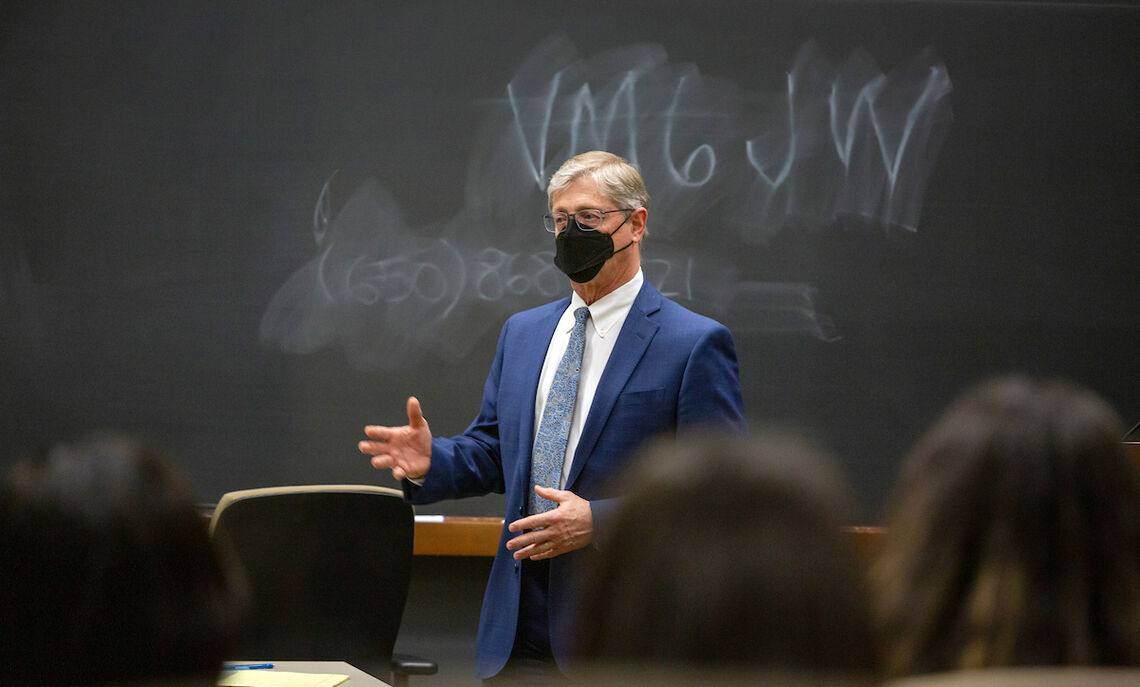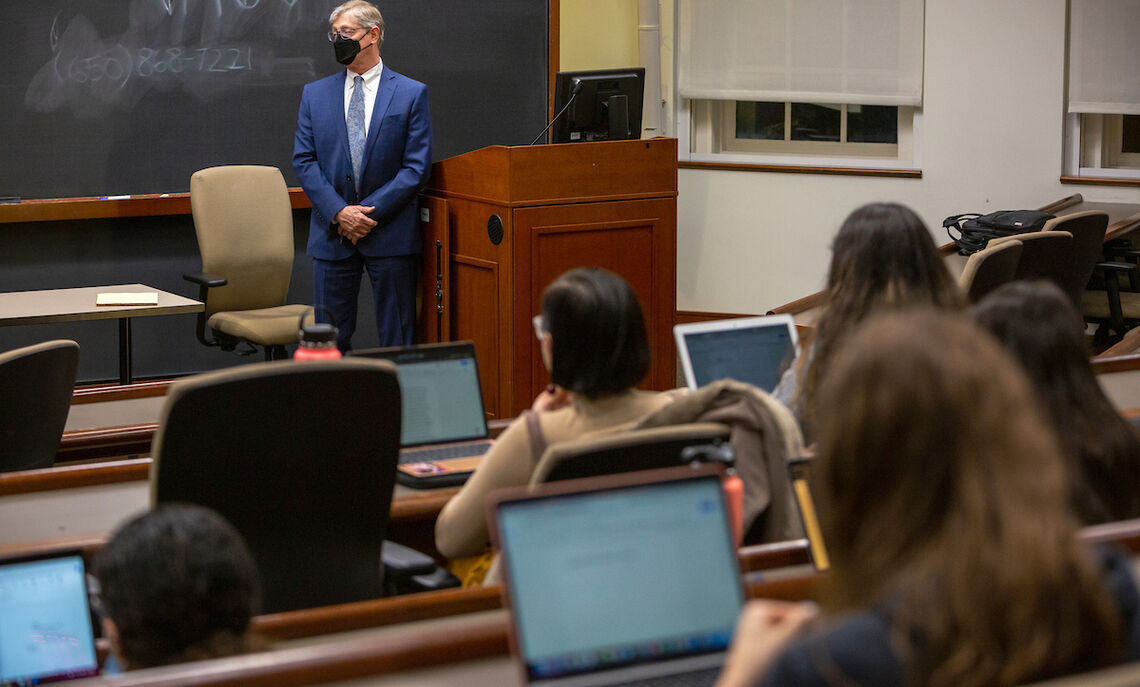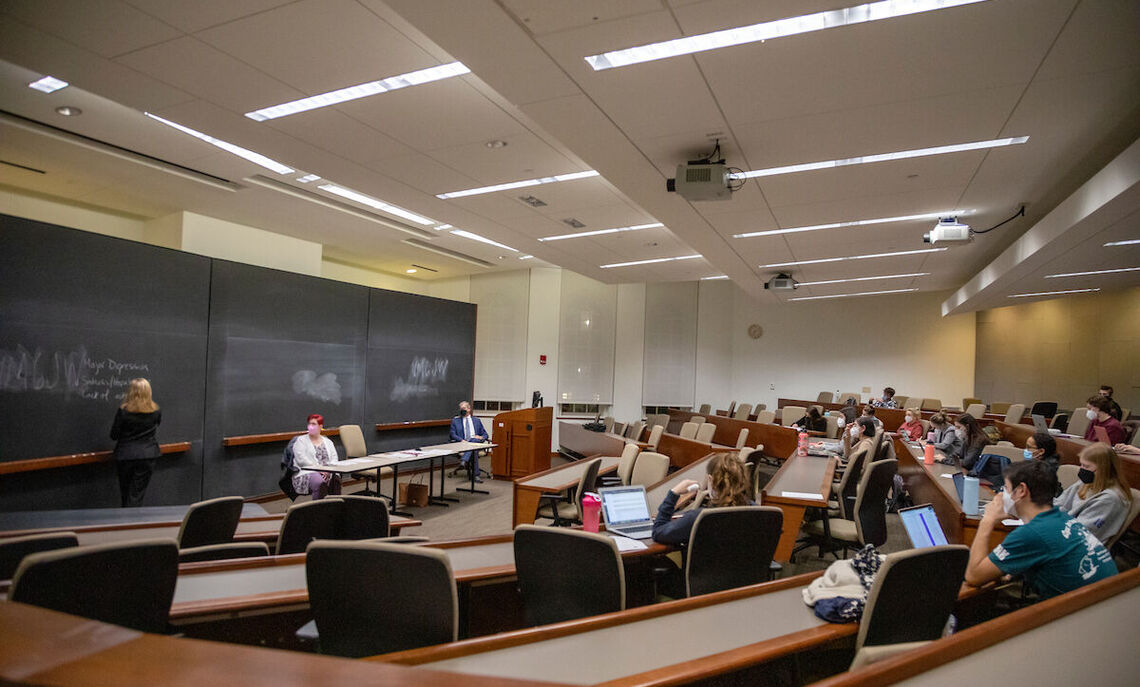F&M Stories
Community-Based Learning Teaches in Real Time
On a recent winter evening, students gather in a Franklin & Marshall lecture hall as Senior Adjunct Assistant Professor of Public Health David Ashworth announces a few pending judiciary field trips.
"I've also been told by the warden that we're a 'go' to visit the prison," says Ashworth, who serves as Lancaster County's President Judge.
As students open notebooks and settle in, he asks whether anyone attended a magisterial district court session, where minor criminal and civil cases are heard. A few hands go up.
"What are your observations?" the judge asks.
Students in this public health course report a variety of cases, including a man facing parole violations and a suspect arraigned on charges of child molestation. Attending all levels of county courts is a course requirement, as is keeping a journal through the semester.
In his courthouse office, Ashworth says, "I tell the students in the very first class that if I'm not able to get them out of their comfort zone sometime during the semester, then I've failed."
More than a decade ago, Ashworth arrived at F&M at the request of a faculty member to develop a community-based learning course on "drug courts," which, as a problem-solving court, focus less on the punitive and more on the recovery and understanding of addictive behaviors.
In 2005, his predecessor as county president judge asked him to organize a drug court, which, since the late 1980s, proved effective in lowering recidivism rates in other states such as Florida, where the first one started.
"Over the years, I've learned a tremendous amount about recovery and addiction – it's now called substance-use disorder – and realized that people who are not involved in this field really don't have a working knowledge or an understanding of what recovery is all about," he says.
Ashworth shared his efforts with Professor of Government Susan Dicklitch-Nelson – they trained at the same karate school – and she encouraged him to teach. He agreed to community-based learning that relies more on experiencing the justice system like drug court.
"One of the best ways to get the word out there is teach the people who are going to be running the world someday, and those are F&M students," he says. "It's really focused on the experiential learning as opposed to lecturing to them and having them regurgitate back onto an exam."
For senior government major Liz Geogelis, the class informed her studies in critical ways.
"One of the main highlights for me has been gaining a new perspective on not only the inner workings of the problem-solving court systems in Lancaster County, but also on the lives of the people in the community who have been impacted by the way these courts operate," she says.
Alumni Akbar Hossain, '13, a University of Pennsylvania law school graduate and F&M trustee, calls the judge "a wonderful mentor" whose teachings about problem-solving courts and the scenes behind the criminal justice system influenced his decision to pursue law.
"Judge Ashworth brought that reality to campus and showed us the good that lawyers can do through creativity and advocacy," he says. "We also learned about the intersection of law and public policy, which everyone thinks about, but it's hard to pinpoint."
Ashworth says he focuses the class on the real world and lists among the field trips a visit to the morgue, where the coroner explains his role and the impact of drugs and overdoses.
"There's nothing like the real-world smell of a morgue that you never forget," he says.
Related Articles
May 15, 2025
Williamson Medalist Learns “Growth Doesn’t Happen When We’re Comfortable”
Shayra Nunez, of New York City, is the 2025 recipient of the Williamson Medal, the College’s most prestigious award for student achievement. It has been awarded annually since 1922. She graduated summa cum laude as a joint major in business, organizations & society, and government. She received the medal at Franklin & Marshall’s Commencement May 10.
April 17, 2025
Kennedy Wilburn ’25 Leads on and off the Court
Kennedy Wilburn ’25 wanted a college where she could excel on the basketball court and in the classroom. She found that and more at F&M, where she became women’s basketball co-captain, a member of the Student-Athlete Leadership Council, and an active participant in other student organizations on campus.
April 10, 2025
Global Grad: Fatimata Ly '25 Pursues Diverse Academic Disciplines
Fatimata Ly’s studies took her to Tunisia and Italy and deepened her passion for international affairs. “Take full advantage of your liberal arts education, explore disciplines you’re unfamiliar with and step outside your comfort zone,” she said.



